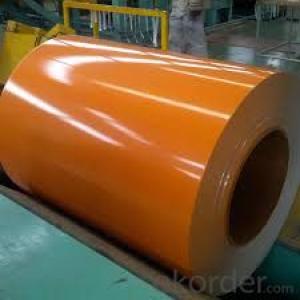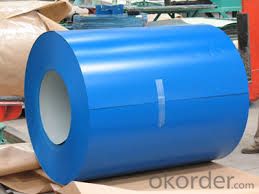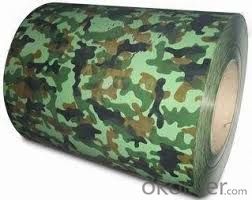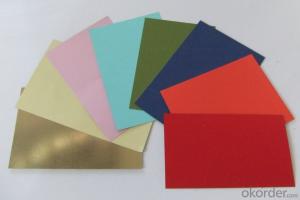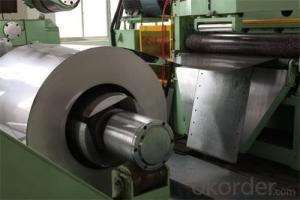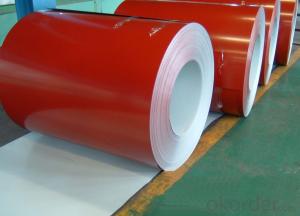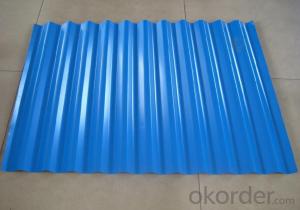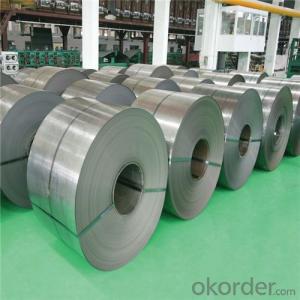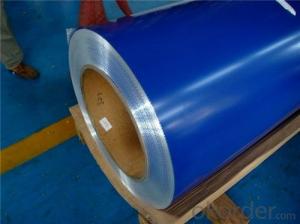Zinc Aluminized Steel/Color Steel Rolled
- Loading Port:
- Shanghai
- Payment Terms:
- TT OR LC
- Min Order Qty:
- 20 m.t.
- Supply Capability:
- 20000 m.t./month
OKorder Service Pledge
OKorder Financial Service
You Might Also Like
Product Description
Specification:
| Product Name: | Galvalume steel coil/GL/Zinc Aluminized steel |
Standard: | JIS G3302-1998/EN10142/ASTM A653/ASTM A792/ AISI/BS/ DIN/GB |
| Price: | US $600-800 / Metric Ton |
| Trade Terms: | FOB/CNF/CIF |
| Supply Ability: | 30000 Metric Ton monthly |
| Packing: | standard exporting packing or at buyer's requirement |
| Payment Terms: | L/C,T/T |
| Delivery time: | Within 15-30days after we receive deposit or L/C at sight |
| Specifications: | Brand Name :CNBM Thickness:0.14-0.6mm Type:coil/sheet/strips Width:600- 1250mm Length: Zinc Coating:40g-150g/ Coil ID :508mm or 601mm Coil Weight :3-8MT Place of Origin:China Tianjing,shanghai Standard: AISI, ASTM, BS, DIN, GB, JIS Technique:Cold Rolled Surface Treatment:Anti-finger |
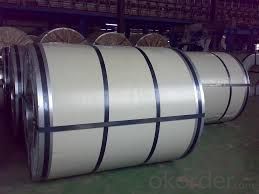
Application
1. Architecture Roofs and outside walls of civilian and industrial buildings, garage doors, fencings and window blinds
2. Appliances Industry Outer clad sheets for washing machine, refrigerator, television, air conditioner and ventilation system, explosion-proof strip, solar water heater and appliance parts
3. Auto Industry Muffler, heat shields of exhaust pipe and catalytic converter, auto parts & accessories under the frame, signboard in highway
4. Industrial Instruments Electric control cabinet, industrial refrigeration equipment, automatic vending machine
Service
1.MOQ:25 ton.
2.Delivery time;15-30days
3.Payment:30% deposite, 70% in L/C before delivery or T/T
4.We can guarantee 100% inspeciton before the shipment
5.We can 100% supply MTC.
Q&A What is your acceptable payment term?
ANSWER: TT,LC,OA etc
- Q: i have searched high and low, but can't find information anywhere!bainitic and pearlitic steels are too in depth, just would like to know if it is hsla steel, or mild steel, or stainless steel etc...thank you in advance :)
- in case you have been to soften rail steel down and pour it into ingots, I doubt anybody could examine to locate this is source besides the fact that a experienced metalurgist could comprehend. whilst the steel grew to become into melted you will desire to toss a handful of previous horseshoes in and alter the composition and no you could comprehend. stable luck such as your challenge, i could decide to comprehend the way it seems.
- Q: How are steel coils used in the manufacturing of agricultural trailers?
- Steel coils are used in the manufacturing of agricultural trailers as they provide strength and stability to the trailer's structure. These coils are typically shaped and welded to form the trailer's frame, ensuring durability and load-bearing capacity. Additionally, steel coils can be used to reinforce certain components of the trailer, such as the axles or suspension system, to enhance its overall performance and withstand the demands of agricultural work.
- Q: Can steel coils be returned if they are damaged?
- Yes, steel coils can typically be returned if they are damaged. However, the return policy may vary depending on the supplier or manufacturer. It is advisable to contact the seller or review the terms and conditions of the purchase to determine the specific return policy for damaged steel coils.
- Q: What are the different methods of steel coil surface cleaning?
- Some of the different methods of steel coil surface cleaning include pickling, shot blasting, and chemical cleaning. Pickling involves immersing the steel coil in an acid solution to remove oxides and scales. Shot blasting uses high-speed particles to remove rust, scale, and paint from the surface. Chemical cleaning involves using specialty chemicals to dissolve contaminants and restore the steel coil's surface.
- Q: What are the commonly used molds steel?
- floor scientific care of different types, I communicate approximately features of chilly paintings die metallic warmth scientific care: chilly paintings mold metallic alloying aspects quantity and style are plenty, alloying is quite complicated. The detrimental thermal conductivity of metallic, the austenitizing temperature is bigger, so the heating technique slowly, preheats or cascade warmth greater. to guard the floor of the metallic high quality, heating medium must be heavily, so the controlled ecosystem furnace, vacuum furnace, heating equipment and greater procedures, including person-friendly use, salt bath heating must be totally digitizing and purification. on the thought of accomplishing quenching, ought to apply a average cooling way. Isothermal quenching, interrupted quenching, intense rigidity gas quenching, including air cooling quenching is someone-friendly technique. with a view to greater strengthen, chilly scientific care, or nitriding floor scientific care has an considerable result and use. Salt bath scientific care must be well timed cleansing, technique protection paintings very heavily. chilly paintings die metallic is costly, chilly paintings mold areas processing complicated, long cycle and intense cost of manufacture. So the formula and operation technologies must be very careful, to circumvent high quality coincidence, confirm the protection of the production technique.
- Q: How do steel coil manufacturers contribute to local economies?
- The local economies are positively impacted by steel coil manufacturers in various ways: 1. Job opportunities are created through the establishment and expansion of steel coil manufacturing plants. This leads to a decrease in unemployment rates and an increase in income levels, resulting in higher local spending and economic growth. 2. A network of local businesses benefits from the demand generated by steel coil manufacturers. These businesses include suppliers of raw materials, equipment, and services such as steel producers, logistics companies, packaging providers, and maintenance service providers. The presence of a steel coil manufacturer stimulates the growth and development of these local businesses, contributing to the overall economic vitality of the region. 3. The steel coil manufacturing industry acts as a catalyst for the development of secondary industries. These industries rely on steel as a primary input and include steel fabrication, construction, automotive manufacturing, and machinery production, among others. The presence of a steel coil manufacturer attracts and supports the growth of these industries, resulting in increased economic activity and job opportunities. 4. Local economies benefit from the payment of various taxes by steel coil manufacturers, including corporate income taxes, property taxes, sales taxes, and employment taxes. The significant tax revenue generated by these manufacturers can be utilized by local governments to fund public infrastructure projects, education, healthcare services, and other essential community services. 5. The economic impact of steel coil manufacturers extends beyond their direct operations. Their presence attracts other businesses and industries to the region, creating a multiplier effect. For example, steel distributors, fabricators, and processors may establish operations nearby to take advantage of the proximity to the manufacturer. This cluster of related industries further contributes to the local economy, creating a self-sustaining cycle of economic growth and development. To summarize, steel coil manufacturers contribute to local economies by creating jobs, supporting local suppliers, stimulating secondary industries, generating tax revenue, and triggering an economic multiplier effect. Their presence enhances the economic vitality of the region, leading to increased employment opportunities, income levels, and overall economic growth.
- Q: I am a beginner and have a slow to average swing speed. Should i get graphite or steel shafts for my irons and does it make a difference?
- The traditional answer was that graphite because the shafts weigh less than steel increase club head speed and would help improve distance for folks with slower swing speeds. The sacrifice was that graphite was less accurate than steel. That is all out of date thinking these days. So much has changed. Composite graphite shafts are now more stable and accurate than before while steel shaft technology has produced lighter steel shafts than before. That being said, I still recommend the graphite unless you are young and still growing. If you are young, then you will most probably grow into the steel shafts. By that I mean that your ability to swing the club faster should improve as you grow physically and learn to swing the club even better.
- Q: How are steel coils inspected for camber?
- Steel coils are inspected for camber by using a straight edge or a camber gauge, which is placed on top of the coil to measure any deviation from straightness. The operator checks the distance between the straight edge and the coil at various points along its length to determine the amount of camber present.
- Q: How are steel coils used in the production of shipping containers?
- Steel coils are used in the production of shipping containers as they are formed and shaped into the required structure and size. The coils are unrolled and cut into sheets, which are then molded and welded to create the walls, roof, and floor of the container. This process ensures the container's strength, durability, and ability to withstand harsh shipping conditions.
- Q: Are steel coils used in agricultural equipment manufacturing?
- Yes, steel coils are commonly used in the manufacturing of agricultural equipment. Steel coils are used to fabricate various components such as frames, chassis, and structural parts that require strength and durability in agricultural machinery.
Send your message to us
Zinc Aluminized Steel/Color Steel Rolled
- Loading Port:
- Shanghai
- Payment Terms:
- TT OR LC
- Min Order Qty:
- 20 m.t.
- Supply Capability:
- 20000 m.t./month
OKorder Service Pledge
OKorder Financial Service
Similar products
Hot products
Hot Searches
Related keywords
